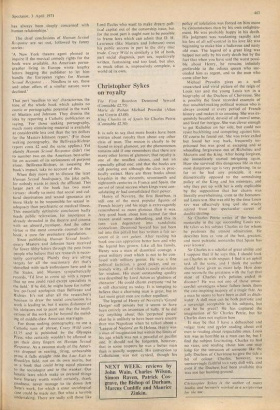Christopher Sykes on royalty
The First Bourbon Desmond Seward (Constable £2.75) It is safe to say that more books have been written about royalty than about any other class of man. The reason is clearly to be found in royal glamour, yet the phenomenon remains odd if one remembers that there are many other forms of glamour; that royalty is one of the smallest classes, and not an especially gifted one; and that the books are still pouring out although the class is prac- • tically extinct. Here are three books about kingship in the sixteenth, seventeenth and eighteenth centuries in France and Spain, the period of royal success when kings were con- solidating or had consolidated their power.
Henry of Navarre, the first .Bourbon, is still one of the most popular figures of French history and his reign is extravagantly remembered as more glorious than it was. Any good book about him cannot for that reason avoid some debunking, and this in turn can degenerate into vandalistic iconoclasm. Desmond Seward has not been led into this pitfall but has written a fair ac- count of le vent galant. After reading his book one can appreciate better how and why the legend has grown. Like all his family, Henry was a man of dauntleg courage, a great military asset which is not to be con- fused with military genius. He was a fine political tactician, a good picker, and ex- tremely witty, all of which is easily mistaken for wisdom. His most outstanding quality was described by Lord Acton as 'gladness of character'. He could charm everyone .■nd he is still charming us today. It is tempting to believe that a charming man is great, but in fact most great men are rather repellent.
The legend of Henry of Navarre's 'Grand Design' still persists but it seems to have been entirely an invention of Sully. If he did say anything about this 'perpetual peace' plan he is unlikely to have been more sincere than was Napoleon when he talked about a 'League of Nations' on St Helena. Henry was a man of imagination but within the limits of his age which was not a peaceful or pacifist one. It should not be forgotten, however, that in some respects he was a better man than is usually supposed. His conversion to Catholicism was not cynical, though his policy of toleration was forced on him more by circumstances than by his own enlighten- ment. He was probably happy in his death. His judgment was weakening rapidly and his loss of all self-control in his love life was beginning to make him a ludicrous and nasty old man. The legend of a great king was helped not only by his early death but by the fact that when you have said the worst possi- ble about Henry, he remains infinitely preferable to the odious queen who suc- ceeded him as regent, and to the men who came after 'her.
Michael Prawdin gives us a well researched and vivid picture of the reign of Louis xin and the young Louis xis, in a biography of the Duchess of Chevreuse. She is possibly the finest recorded example of that mischief-making political woman who is always around at every period of French history and makes it so amusing. She was ex- quisitely beautiful, devoid of all moral sense, and lived for intrigue. She was clever enough to get Richelieu on her side, but could not resist backbiting and conspiring against him. Of course he found out. She was twice exiled but found her way back, frequently im- prisoned but was good at escaping and at wheedling forgiveness out of Richelieu and Mazarin and the King. After being forgiven, she immediately started intriguing again. How she survived this dangerous life in that most dangerous age is very perplexing. In so far as he had any principle, it was diametrically opposed to the centralising policy of the King and his ministers, and why they put up with her is only explicable by the supposition that her charm was literally overwhelming, even to the homosex- ual Louis mu. She was old by the time Louis xis/ was effectively king ::.nd she wisely retired from her spectacular career of double-dealing.
Sir Charles Petrie writes of the Spanish monarchy in the age succeeding Louis xis/. He takes as his subject Charles in for whom he professes the utmost admiration. He describes him as 'one of the best, greatest, and most patriotic monarchs that Spain has ever known'.
Sir Charles is a scholar of great ability and 1 suppose that if he says this, I should look on Charles in with respect. 1 find it an uphill task all the same, and I think the author should have given us more help. How does one reconcile the greatness with the fact that most of Charles nes policies ended in disaster? He was not one of those unsuc- cessful sovereigns whose failure lends them the awe-inspiring majesty of a tragic fate. As
a man he seems to have been as dull as ditch-
water. A dull man can be both patriotic and a sovereign acceptable to his subjects, but can he be great? He has captured the imagination of Sir Charles Petrie, but Sir Charles does not explain how.
It may be that I have a debauched and vulgar taste and %refer reading about evil men to reading about respectable ones. Louis xm was as horrible as a man can be, but I find the subject fascinating. Charles iii had no vices, and reading about him one may long for the intrusion of someone like the jolly Duchess of Chevreuse to give the tale a bit of colour. Charles, however, was unswervingly faithful to a very dull wife, and even if the Duchess had been available this was not her hunting-ground.
Christopher Sykes is the author of many books, and formerly worked as a scriptwriter for the uric


































 Previous page
Previous page